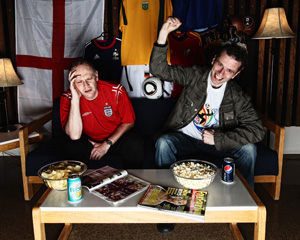 |
| Chris Moore (left) and Jure Gantar get their game on in anticipation of the FIFA World Cup (Nick Pearce photo) |
Jure Gantar is grinning with excitement.
The acting dean of the Faculty of Arts and Social Sciences is a lifelong soccer fan and his home country of Slovenia is one of 32 nations that will compete in the FIFA World Cup.
If Canadians were galvanized for two weeks in February as our athletes won 14 gold medals in the Winter Olympics, the FIFA World Cup offers a similar obsession for the rest of the world; it is arguably the true global sporting event. A total of 204 countries entered the tournament’s qualification rounds back in 2007 – 12 more countries than the United Nations officially recognizes.
Beginning Friday, the survivors of that three-year process will compete in South Africa for the ultimate prize in the world's most popular sport. Winning won't be easy; in fact only seven countries have ever won the World Cup, the cream of the crop being Brazil with five titles. But this year’s tournament, the first hosted in Africa, is wide open. The usual suspects – Brazil, Italy, Argentina, Spain, England, Germany, Holland – are once again considered the favourites. But the beauty of the tournament is the possibility of an unexpected performance by an unknown player, or the inevitable surprise run by an underdog.
Dr. Gantar hopes that this year Slovenia might be that underdog. "For Slovenia to make it to the second round, that would an amazing result," he says, "Slovenia is a country where soccer is not the primary sport, and for these players to have qualified for the World Cup is in itself a great accomplishment."
Flip Dr. Gantar's optimism 180 degrees and you have the perpetual pain of English soccer fans. To be an English soccer supporter is to suffer every four years as a promising team somehow manages to find a way to lose, whether it’s an ill-timed red card – see David Beckam '98, Wayne Rooney '06 – or a heartbreaking penalty-kick loss, as in the 1990 semi-final against West Germany.
Chris Moore, dean of the Faculty of Science, remembers those years all too well. Dr. Moore, who immigrated to Canada in 1985, tries to keep a positive outlook though. "I think England can reach the semi-finals," he postulates about his homeland’s team. "There is not as much pressure on this team as in the years’ past, but its still a very good side."
He’s right in that the pressure may finally be off the most talked-about, and arguably most underachieving, soccer team in the world. The English media is relentless in its coverage of the team, both on and off the field. But key injuries to stars David Beckham and Rio Ferdinand, as well as various scandals including former captain John Terry's extramarital affair, while at first distracting, have perhaps helped bring the players closer as a team and may have lowered expectations. "It may be fair to say that people have accepted that England is not in the elite class that English fans like to put them in," says Dr. Moore, adding that having the disciplined and tactical Fabio Capello as manager will only help the team's chances.
Whatever happens, both men will be watching the games intently. In fact, when England and Slovenia play each other on June 23 – a game that could decide the fate of both teams – Dr. Gantar will be in London. "I will have to find a good place to watch the match," he says with a wry smile. "Hopefully England will have already won its way into the second round, and then maybe we have a chance to advance as well."
If the English or Slovenians do manage to overcome the odds and win it all, they will have set at least one new standard: no European team has ever won the World Cup when it has been played outside of Europe.
